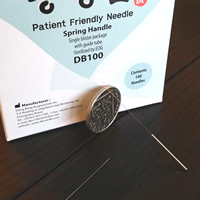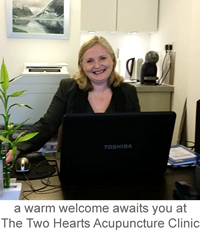
 Acupuncture in Norwich with Stephen Ellis
Acupuncture in Norwich with Stephen Ellis
* Notice *
Due to the current COVID-19 Pandemic, the clinic will be closed until further notice.
Sorry for any inconvenience.
Stay safe, until we can see you again, Stephen & Sam.
"Stephen is very gentle, I honestly didn't feel any of these needles." Mr G - Wymondham “I found my first visit to be a positive and relaxing experience and felt no discomfort from the needles” Mrs T - Norwich “He
listened really well to how I described my symptoms ... I felt heard and
respected, my experiences valid and valued as markers along the path to
feeling well.” Ms C - Norwich |
Stephen graduated from the London College of Traditional Acupuncture in 1995, and is a Member of the British Acupuncture Council and an Associated Practitioner of Arthritis Action
He now works 3 days a week in The Two Hearts Acupuncture Clinic - a bright and welcoming new purpose-built clinic alongside his home in Hellesdon. He welcomes returning clients here who may have seen him during his time working at Hellesdon Medical Practice on Reepham Road, from 1997 to June 2014; and from The Humbleyard Centre for Complementary Therapies in Mulbarton, where he worked from 1997 to March 2015.
The Two Hearts Clinic has good disabled access, and a friendly receptionist who will be happy to make you complimentary drink when you arrive (see our Where Are We page for more information, and details of how to find us).
Stephen is always happy to take a call on 01603 485096 or 07515 401420 if you have any queries or concerns you wish to discuss. You are very welcome to email or text him too.
Stephen aims to make your treatment as professional, painless and caring as possible, because this is how he would like to be treated. He is aware of people’s fears about needles but, as he frequently tells clients:
 “I use a very fine, high quality, expensive South Korean needle, that’s specially designed to be patient friendly. They are inserted via a hollow plastic tube, and are literally flicked through the top layer of skin. This is where the pain cells are most concentrated, and by using this method any discomfort is kept to a minimum, generally being felt as just a slight prick, if at all. Cheaper needles tend to be thicker and in my experience cause discomfort to the client.”
“I use a very fine, high quality, expensive South Korean needle, that’s specially designed to be patient friendly. They are inserted via a hollow plastic tube, and are literally flicked through the top layer of skin. This is where the pain cells are most concentrated, and by using this method any discomfort is kept to a minimum, generally being felt as just a slight prick, if at all. Cheaper needles tend to be thicker and in my experience cause discomfort to the client.” "In addition, there are specific techniques in western medical and Chinese TCM acupuncture practice that call for the needles to be strongly manipulated after insertion. I do not use these methods as they may cause discomfort to the recipient. My aim is always to be as gentle as possible, for example Mrs S from Sprowston said "I have found Stephen's acupuncture to be virtually painless" ."
However, for more sensitive clients, or if they simply prefer, Stephen can also substitute the acupuncture needles for tiny magnets to energise the acupuncture points equally as well. They are manufactured with a small plaster backing, and can easily be stuck on the skin, and removed as easily afterwards.
What is Acupuncture and how does it work?
Traditional acupuncture is an ancient form of healthcare that has been practised in China and the Far East for close on two thousand years. It is proven to be an extremely safe therapy.Acupuncture was founded upon the belief that disease is felt in the body when its vitality, or Qi, is disrupted by imbalances in its physical, emotional and mental faculties. It is a holistic therapy, in that it aims to treat the whole person as a way to regain balance and restore vitality, to improve their wellbeing. Because the person and their condition is treated, they may generally feel better in themselves, have more energy, improved sleep and feel happier.
These days, studies have revealed that acupuncture has numerous physiological effects upon the body which can provide health benefits, with regards to increasing positive hormone levels, stimulating nerve pathways, and through producing an anti-inflammatory effect.
This makes acupuncture effective in not only relieving pain, but to treat a wide range of conditions through its ability to stimulate the body's own natural healing response. More and more clinical trials are being conducted to demonstrate its value, both here in the UK and abroad, helping it to gain recognition with organisations such as The National Institute for Clinical Excellence and the World Health Organisation.
What can acupuncture treat?
Since March 2011, all British Acupuncture Council (BAcC) members are obliged to follow strict advertising guidelines from the Advertising Standards Authority (ASA). This restricts the mention of treatment for specific medical conditions by the use of Acupuncture.Research Fact Sheets have been produced by The British Acupuncture Council in order to provide accurate and unbiased information for a variety of conditions. They provide summaries of research and how acupuncture may be beneficial.
Fact sheets are available on:
• Acne
• Allergic rhinitis
• Anxiety
• Back Pain
• Bell’s Palsy
• Cancer care
• Carpal tunnel syndrome
• Childbirth
• Chronic Fatigue Syndrome
• Chronic pain
• Colds and Flu
• COPD
• Cystitis
• Dentistry
• Depression
• Dysmenorrhoea (period pain)
• Eczema and Psoriasis
• Endometriosis
• Female fertility
• Fibromyalgia
• Frozen Shoulder
• Gastrointestinal tract disorders
• Headache
• Herpes
• Hypertension
• Infertility ART
• Insomnia
• Irritable bowel syndrome (IBS)
• Menopausal symptoms
• Migraine
• Nausea and Vomiting
• Neuropathic pain
• Obesity
• Obstetrics
• Osteoarthritis
• Parkinson’s Disease
• PCOS
• Post-operative pain
• Premenstrual syndrome (PMT)
• Raynaud’s
• Rheumatoid arthritis
• Sciatica
• Sinusitis
• Sports Injuries
• Stress
• Stroke
• Substance misuse
• Tennis elbow
• Tinnitus
• Type-2 diabetes
• Urinary Incontinence
• Vertigo
Visit www.acupuncture.org.uk for this information.
 “I would definitely recommend acupuncture with Stephen. He is a
very kind and caring person, who listens carefully and gets to the heart
of the matter quickly and effectively.” Mrs G - Norwich
“I would definitely recommend acupuncture with Stephen. He is a
very kind and caring person, who listens carefully and gets to the heart
of the matter quickly and effectively.” Mrs G - Norwich